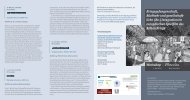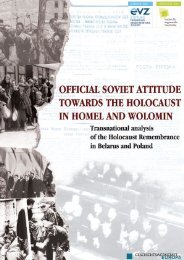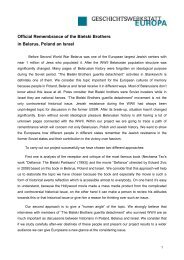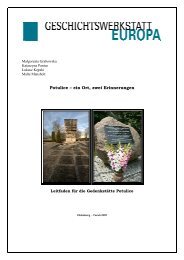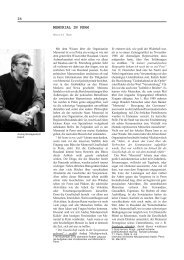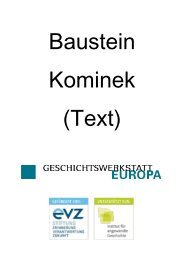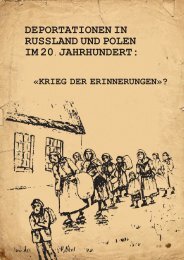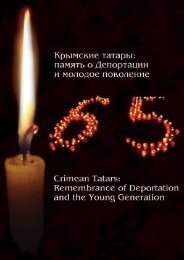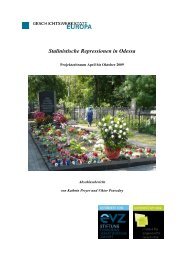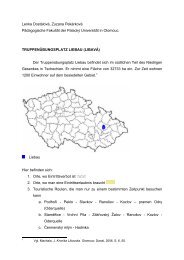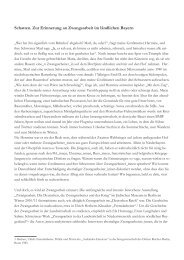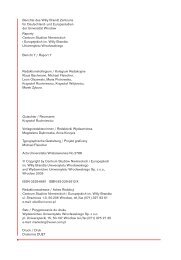download method paper - Geschichtswerkstatt Europa
download method paper - Geschichtswerkstatt Europa
download method paper - Geschichtswerkstatt Europa
Create successful ePaper yourself
Turn your PDF publications into a flip-book with our unique Google optimized e-Paper software.
Broken Branch of the Boiken Tree:<br />
Forced Deportation of 1951 and its Consequences for Boiken Population from the Beskids<br />
Mountains<br />
Our project focuses on the history and identity of Boikos as former residents of Beskids (Beskids<br />
are mountains in Europe, stretching from the Czech Republic in the west through Slovakia and<br />
Poland to Ukraine in the east). Boikos are an ethnic group living in the Carpathian Mountains<br />
(nowadays the Ukraine) and in Beskids Mountains (nowadays Poland). The Boikos adopted the<br />
Ukrainian national identity.<br />
The historian Dmitry Vyedyenyeyev wrote: "The reunification of Western Ukraine from the rest of<br />
the ethnic Ukrainian lands in the Ukrainian SSR, which occurred in 1939-1940, respectively, had<br />
objectively progressive character, laid the historical background for the unity of Ukrainian lands.<br />
However, the model of totalitarian politics of Stalinism already worked in the Soviet Ukraine and<br />
other republics of the USSR was immediately transferred in the Western region. It starts mass<br />
repression. If at first it was directed primarily against "socially hostile elements" among the wealthy<br />
citizens and members of national political organisations (...) then gradually they acquire a mass<br />
character (deportation, imprisonment, etc.).<br />
In 1951 an eviction occurred against civilians of then Drohobych region (Ukrainian People's<br />
Republic, USSR) in the south of the Ukraine. The Polish-Soviet territorial exchange of roughly 480<br />
km² and border adjustment was due to the Polish-Soviet treaty of 1951, which had been signed in<br />
Moscow between the People's Republic of Poland and the USSR. Over 30 thousand inhabitants of<br />
Beskids were evicted to the south of Ukraine (e.g. Mykolajivska, Odeska, Chersonska and<br />
Mykolaivska regions).<br />
Boikos suffered a lot from this violent eviction from their ethnic territories in 1951. It divided the<br />
Boikos' ethnic group into tree parts (one still living in Carpathian Mountains, the Eastern Boikos)<br />
while second one was evicted to the southern part of the Ukraine (Western Boikos). Third branch<br />
of Boikos live in foreing countries (Poland, USA, Canada, Australia, Russia).<br />
The projects' goal is to find out more about the identity of Western Boikos (inhabitants of Beskids)<br />
in the context of their history. We want to examine the forcible relocation of its population in 1951.<br />
We want to look at the history of Skorodne village (it had belonged to Drogobych region, Ukraine,<br />
after 1951 to Podkarpacie, Region Lutowiska ) according to remembrances of those who still<br />
memorize them being in Skorodne. In this village Boikos used to have their own customs, social<br />
rules and laws. As an ethnic group being isolated in Beskids mountains Boikos', inhabitants of<br />
Skorodne, developed their own artifacts in house building, textile production, preparing food, folk<br />
songs and legends. These artifacts distinguish them from other ethnic groups in Beskids (Lemkos,<br />
Huzulen). Also the Boiko's dialect underlines this difference.<br />
The issue of national and cultural identity gets more and more attention in post-socialist societies.<br />
Volodymyr Zviglyanich, a senior research fellow of the Ukrainian Academy of Sciences' Institute of<br />
Sociology, wrote: "In Marxist-Leninist philosophy and social studies in the USSR and Ukraine there<br />
was no place for research into questions of national self-identification, national characteristics,<br />
1
national ways of running the economy and the national character (Zviglyanich, 2009).“ If the issue<br />
of national identity in Ukraine was suppressed, the issue of ethnic minorities and their identities in<br />
Ukraine in general de facto did not exist for discussion in Soviet society. This applied especially for<br />
Boiko's ethnic group, residing the border strip, which divided then Ukrainian Soviet Republic<br />
(USSR) and the Polish People's Republic in period till 1951.<br />
What is left and has been saved from those Boikos identity is a big question which we want partly<br />
to answer with our project. We want to collect knowledge about the history and culture of Skorodne<br />
village the way Boikos remember it. We would like to approach the people from Boiko’s community<br />
in Krywe Ozero Mykolajivska region in the Ukraine (the place where Boikos from Skorodne have<br />
been deported) to speak about Boikos identity, how they perceived themselves before and after the<br />
deportation. We would like to ask Boikos to remember what still have left in their memories about<br />
their life, culture and history in Beskids Mountains before 1951. We would like to see which<br />
customs have been saved, which folks songs and which legends are still in use. We want to hear<br />
how the Boikos' dialect developed so far.<br />
We are going to reach our goal by scientific <strong>method</strong> of oral history, particularly narrative<br />
(biographic) interview. We want interview at least 20 persons.<br />
Tatiana Pastushenko describes the <strong>method</strong> as follows: "Narrative interviews is a free interview,<br />
which looks like the story of persons' life without interference from the interviewer, who asks only<br />
general direction of the narrative, which is expected. It is assumed that during a free presentation<br />
in memory of the narrator associative arising primarily those scenes and moments that have the<br />
greatest subjective value, so you can find sensitive points constructing their biographical narrative<br />
(Tatiana Pastushenko, 2010)“.<br />
With advantages of narrative (biographic) interviews we want to allow the witness to speak about<br />
her/his memories. We assume, that her/his memory includes not only individual aspects but also<br />
collective onces, and that the latter will give a glance on the repressive system in the Soviet<br />
Ukraine. We ask our respondents how their percieved the soviet regime in the region of Beskids<br />
and what excately they suffered from. We don't want to emphasis on Boikos as victims of Soviets<br />
repressive system but rather to understand subjective biographical experience of people we will be<br />
listening to. From our point of view, the interviews are not only subjective and biographical but at<br />
the same time historical.<br />
All our research will be recorded in audio- and video-formats. Through conversations and videorecording<br />
of life stories of Boikos we expect to understand a microcosm of former Beskids'<br />
population, the way they perceived the new conditions in the south of Ukraine.<br />
Working with transcripts and at the same time with audio and video files we will try to go beyond<br />
textual analysis. Voice and picture are not neutral media – they bear meaning that could be<br />
explored. We will classify the stories as common for many of our interviewers and those which<br />
have individual meaning. We will compare interviews according to different criteriums (historical,<br />
ethnographical, personal) to be able extract the Boikos' common identity according to the<br />
experience of Boikos in different historical and ethnografical conditions.<br />
In order to present the results of our research we will make a multimedia-publication for internet<br />
use (portal of boikos www.bojky.wordpress.com and other Ukrainian media portals).<br />
The results of project are supposed to tell us about the life of Boikos in Skorodne before 1951. In<br />
such a way we would like to reach a point of historical justice towards Boikos' population who<br />
2
survived through violent deportation in 1951, lost the connection to their native land but still have a<br />
right to be recognized as an ethnic group with its own history. The reconstruction of their history<br />
and culture, the identity of their village are the Boikos heritage which in fact belongs to the<br />
European cultural heritage.<br />
The results of our research will publish, amongst GWE-Website, on: http://boyky.wordpress.com,<br />
http://www.los.org.pl/, www.http://lemky.com.<br />
Olga Samborska<br />
Zoryana Svystovych<br />
Anna Gluh<br />
Selected Literature:<br />
Volodymyr Zviglyanich: Ukrainian identity and challenges of modernity“, Prism Volume: 5 Issue: 5.<br />
Vedomosti of the Supreme Soviet of the USSR, Moscow, 1951, 14.VII, № 23.<br />
Dmitry Vyedyenyeyev: Creating network of soviet troops and state security in Western Ukraine (1939-1941), magazine<br />
„Military history“, #5 (47), 2009.<br />
METHOD AND ORAL HISTORY RESEARCH oral history IN UKRAINE, History of Ukraine, January 17 -18 (657-658),<br />
May, 2010.<br />
Tetyana Velichko, Tetyana Pastushenko, Field School of FF-term history of "Holocaust through the eyes of non-Jewish<br />
population of Ukraine", in East / West: Ist.-cult. Coll. / East. Institute of Ukrainian Studies. Kowalsky et al. - Vol. 11.12:<br />
Spec. ed.: An Oral History in modern social and humanitarian-making studies: theory and practice of research. - H.,<br />
2008.<br />
This Project is realised in the call on „War, Post War, Cold War“ of <strong>Geschichtswerkstatt</strong> <strong>Europa</strong>. It<br />
is one of 28 European projects that is funded by the foundation „Remembrance, Responsibility and<br />
Future“.<br />
<strong>Geschichtswerkstatt</strong> <strong>Europa</strong> is a programme of the foundation „Remembrance, Responsibility and<br />
Future“ addressing the issue of European remembrance. The Institute for Applied History<br />
coordinates the funding of projects in cooperation with the European University Viadrina. The<br />
International Forum is organised by the Global and European Studies Institute at the University of<br />
Leipzig.<br />
Quoting form:<br />
Samborska Olha, Svystovych Zoryana, Gluh Anna: Broken Branch of Bojken Tree: Forced<br />
Deportation of 1951 and its Consequences for Bojken Population from the Beskid Mountains, in:<br />
<strong>Geschichtswerkstatt</strong> <strong>Europa</strong>, 31.05.2012, URL:<br />
http://www.geschichtswerkstatt-europa.org/media/projekte/Methodenpapier/MP_Bojken.pdf<br />
Copyright (c) 2012 by <strong>Geschichtswerkstatt</strong> <strong>Europa</strong> and the author, all rights reserved. This work<br />
may be copied and redistributed for non-commercial, educational purposes, if permission is<br />
granted by the author and usage right holders. For permission please contact<br />
info@geschichtswerkstatt-europa.org.<br />
3



